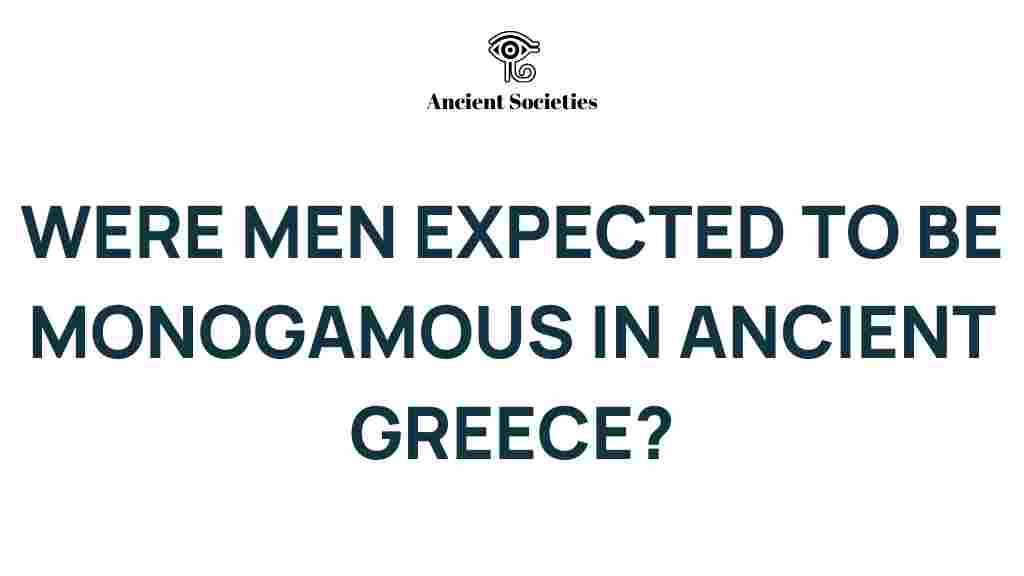Monogamy in Ancient Greece: A Surprising Reality Unveiled
When we think of Ancient Greece, images of philosophers, warriors, and grand temples often come to mind. However, the societal norms surrounding relationships, particularly monogamy, offer a fascinating insight into the complexities of Greek culture. Surprisingly, the concept of monogamy held a unique place in the relationships of Ancient Greece, challenging many modern assumptions about love, family structure, and gender roles.
The Historical Context of Relationships in Ancient Greece
To understand the role of monogamy in Ancient Greece, we must first explore the historical expectations and cultural values of the time. Ancient Greek society was predominantly patriarchal, with men’s roles often defined by masculinity and honor. The family structure was crucial, serving as the foundation for social and political alliances.
- The primary purpose of marriage was to produce legitimate heirs.
- Women were generally viewed as caretakers and bearers of children.
- Men had more freedom in their relationships, often engaging in extramarital affairs.
Despite the allowance for extramarital relationships among men, the institution of marriage still emphasized the importance of monogamous unions. It was common for men to marry young women, often much younger than themselves, to ensure fidelity and stability within the family.
Monogamy vs. Polygamy: Understanding Greek Marital Practices
While polygamy was not widely practiced in Ancient Greece, the cultural acceptance of concubinage and extramarital relationships indicates a nuanced approach to monogamy. Greek men often maintained relationships with courtesans, known as hetairai, who were educated and could engage in intellectual discussions, which was an attractive quality for men seeking companionship beyond their marriages.
Thus, the concept of monogamy in Ancient Greece was not as straightforward as it may seem. The societal norms allowed for a duality in relationships, where men could fulfill their desires outside of their marriages while still being expected to uphold a monogamous commitment to their wives.
Gender Roles and Societal Norms
Gender roles in Ancient Greece were strictly defined, with men enjoying a higher status in both public and private life. Women’s roles were primarily domestic, centered around the household and family. This disparity influenced the dynamics of monogamous relationships:
- Men were expected to provide for their families and maintain their honor through virtuous behavior, which often included having a monogamous wife.
- Women were expected to be loyal and devoted to their husbands, with little expectation of independence or personal freedom.
This imbalance affected how relationships were formed and maintained, with monogamy serving as a means of ensuring lineage and property rights. The expectation of fidelity from women was critical, while men often navigated societal norms with more flexibility.
Family Structure and Monogamy
The family structure in Ancient Greece was heavily influenced by the need for legitimate heirs. Monogamy was often viewed as a means to ensure the continuation of the family line. In this context, relationships were less about romantic love and more about social obligation and economic stability.
Throughout various city-states, such as Athens and Sparta, the expectations regarding family life and monogamous relationships varied:
- Athens: The Athenian ideal emphasized the importance of a stable home, where women were expected to manage the household while men engaged in public life.
- Sparta: Spartan society valued strength and military prowess, and while monogamous marriages were common, the emphasis was on producing strong offspring.
Historical Expectations of Monogamy
Throughout history, monogamy was often tied to the legal and economic frameworks of Ancient Greece. Marriage contracts were designed to protect property rights and ensure the legitimacy of heirs. This legalistic approach meant that monogamous unions were not only personal commitments but also socio-economic necessities.
As such, the historical expectations of monogamy were intertwined with cultural and economic realities, shaping the way relationships were structured and understood. While love and companionship were certainly valued, the overarching need for stability and lineage often took precedence.
Challenges and Troubleshooting Monogamous Expectations
Despite the structured nature of relationships, challenges to monogamous expectations were not uncommon. Men often faced societal pressures to engage in extramarital affairs, leading to conflicts between personal desires and social obligations. Here are some key challenges:
- Social Pressure: Men were often expected to demonstrate their masculinity through conquests and relationships outside their marriages.
- Emotional Disconnect: The lack of romantic love in some marriages could lead to dissatisfaction and infidelity.
- Economic Factors: Marriages were often arranged for political or economic reasons, leading to a lack of personal choice.
To navigate these challenges, individuals often relied on the support of their social networks, including friends and family, who could provide guidance and counsel. Understanding the historical context of these relationships can also help modern readers appreciate the complexities of love and commitment in Ancient Greece.
Conclusion: The Legacy of Monogamy in Ancient Greece
Monogamy in Ancient Greece presents a fascinating tapestry of cultural norms, societal expectations, and historical realities. While the concept of monogamous relationships was present, it existed alongside a complex web of gender roles and familial obligations that shaped individual experiences.
The legacy of these ancient practices continues to inform contemporary discussions about relationships and monogamy. As society evolves, understanding the historical context of such concepts can provide valuable insights into the ongoing debates around love, commitment, and family structure.
For those interested in exploring more about the intricate relationship dynamics in ancient cultures, consider visiting this resource.
To delve deeper into the societal norms that shaped Ancient Greece, check out this article.
This article is in the category History and created by AncientSocieties Team
